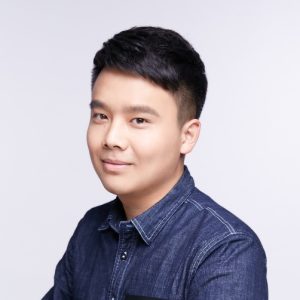LCSR Student Seminars: Dimitri Lezcano and Wangqu Liu
3400 N Charles St
Dimitri Lezcano, M.S.E.
PhD Candidate
Laboratory for Computational Sensing and Robotics
Title: Shape-Sensing, Shape-Prediction and Sensor Location Optimization of FBG-Sensorized Needles
Abstract:
Needle insertion is typical for surgical intervention including biopsy, cryoablation, and injection. To reduce tissue damage and for vital organ obstacle avoidance, asymmetric bevel-tipped flexible needles are commonly used for needle insertion. The challenges for accurate needle placement in minimally-invasive surgeries requires modalities for determining the needle position during insertion. Current modalities for 3D needle positioning, like magnetic-resonance imaging, computational tomography and ultrasound are either too slow, require large amounts of radiation over sustained periods, and/or are not precise enough. Embedding flexible bevel-tipped needles with fiber-Bragg grading (FBG) sensors enables for shape-sensing capabilities for accurate and real-time needle localization during needle insertion. Our shape-sensing model leverages Lie group theory and curvature sensing to not only provide accurate 3D shape-sensing, but to perform shape-prediction during needle insertion. The conducted experiments will demonstrate our model’s effectiveness on determining and predicting needle shape in isotropic phantom tissue using a novel hybrid deep learning and model-based approach. Furthermore, a presentation of constructive optimization of FBG sensor placement along with the framework to stochastically modeling needle shape-sensing, will be included.
Bio:
Dimitri Lezcano is a fifth year PhD candidate in LCSR’s Advanced Medical Instrumentation and Robotics Laboratory at Johns Hopkins University working with Professor Iulian Iordachita and Professor Jin Seob Kim. He received a B.A. in Physics and Mathematics from McDaniel College (2015) and M.S.E. in Robotics (2020) from Johns Hopkins University. His research focuses on the instrumentation and application of flexible, shape-sensing, needles in minimally-invasive surgical interventions.
 Wangqu Liu
Wangqu Liu
Ph.D. Candidate, Gracias Lab
Department of Chemical and Biomolecular Engineering
Title: Autonomous Untethered Microinjectors for Gastrointestinal Delivery of Insulin
Abstract:
Delivering macromolecular drugs like insulin via the gastrointestinal (GI) tract is challenging due to the low stability of these drugs and their poor absorption through the tight GI epithelium. An innovative approach has been developed using untethered microscopic robots to break the epithelial barrier and improve the delivery of these drugs.
In this talk, I will present our research on autonomous untethered micro-robotic injectors for the gastrointestinal delivery of insulin. These submillimeter-sized microinjectors utilize thermally activated, prestressed thin films that function like micro-spring-loaded latches. Once triggered by body temperature, the arms of microinjectors self-fold. The shape-changing motion allows the injection tip to penetrate the GI epithelium, efficiently delivering insulin with bioavailability in line with intravenous injection. Due to their small size, tunability in sizing and dosing, wafer-scale fabrication, and parallel, autonomous operation, we anticipate these microinjectors will significantly advance drug delivery across the GI tract mucosa to the systemic circulation safely. We will conclude the talk by discussing the future development of ingestible active drug delivery systems incorporating microinjectors.
Bio:
Wangqu is a Ph.D. candidate in the Chemical and Biomolecular Engineering department, advised by Prof. David Gracias. His works mainly focus on the development of shape-morphing microdevices and related systems for biomedical applications such as drug delivery, minimally invasive surgery, and biopsy. He received a B.Eng. in Chemical Engineering from Beijing Forestry University (2017), where he focused on developing biomass-based sustainable nanomaterials for water treatment. He later joined the Johns Hopkins University for his M.Sc. (2019), where he worked on developing 3D printing functional hydrogel materials and shape-changing structures.


